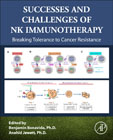
Successes and Challenges of NK Immunotherapy: Increasing Anti-tumor Efficacy
Bonavida, Benjamin
Jewett, Anahid
Successes and Challenges of NK Immunotherapy: Increasing Anti-tumor Efficacy describes the unique therapeutic applications of NK cells to fight cancers and eliminate the bulk and subset of cancer stem cells responsible for metastasis, relapse and recurrences. The book provides information on the development, engineering, mechanisms of action, response to various preclinical models, and applications in various clinical trials. Sections cover the development of highly engineered cytotoxic NK cells, their mechanisms of action, preclinical and clinical applications, the development and application of CAR-NK cells, and new NK-drug conjugates, also emphasizing that activated NK cells can target and kill highly resistant cancer stem cells. Written by the leading experts on NK immunotherapy worldwide, this is a valuable resource for researchers, clinicians and members of the biomedical field who are interested in understanding novel and efficient therapies to fight cancers. Discusses the unique developmental applications of NK immunotherapy against cancers, which differs greatly from other types of immunotherapiesProvides up-to-date and highly relevant information through chapters written by the leading researchers in the fieldPresents a significant number of schematic diagrams for easy understanding and reproducibility INDICE: Section 1: Modulation of NK Antitumor Activities 1. Engineered Human Pluripotent Stem Cell-Derived NK Cells with Improved Anti-tumor Activity 2. The Cancer - NK cell Immunity Cycle 3. Immunometabolic reprogramming of NK cells for immunotherapy of solid tumors 4. Immunoregulation of NK cells: Similarities and Differences Compared to T cells 5. Tracking the decay of TGFb-resistant NK cells identifies an immune clock of innate cell aging Section 2: Regulation of NK Antitumor Activities 6. Oncolytic virus therapy for cancer; role in activation of NK cells 7. Rendering NK cells resistant to immune suppression: genetic modification with a dominant negative receptor for TGF-Beta 8. Cystatin F, an inhibitor of cysteine cathepsins, regulates the cytotoxicity of NK cells 9. The NCR2-PCNA Immune Checkpoint and Natural Killer-based immunotherapy 10. Tumor derived soluble human NKG2D ligand mediated perturbations in NK cell metabolism and therapeutic implications 11. The expression of high affinity recombinant Fc receptors by engineered natural killer cells to enhance cancer cell killing by ADCC Section 3: NK Antitumor Immunotherapy 12. The many key functions of Natural Killers cells in premalignant and malignant stages of tumorigenesis; when these gatekeepers are gone or defective anarchy ensues 13. Phenotypic plasticity: the emergence of cancer stem cells and collective cell migration 14. Stem cell-engineered invariant natural killer T cells for cancer immunotherapy 15. Natural killer cells in the glioblastoma stem cell niche microenvironment 16. CAR-redirected Cytokine-Induced Killer lymphocytes against sarcomas 17. The Effect of Natural Killer Cells on HIV-1 Rebound in Humanized Mice Section 4: NK Antitumor Immunotherapy 2 18. NK cells are innate actors in the immunosurveillance of melanoma 19. Patients with prostate cancer associate with altered features of Natural Killer cells in terms of pro-angiogenic function and M2-like macrophage polarization capacity 20. New therapeutic approaches to target malignant gliomas 21. Mobilizing Human iNKT cells for Cancer Immunotherapies 22. Initial Innate Immune Responses to Tumor Metastasis 23. Regulating NK cell homeostasis and function by tumor associated NKG2D ligand MIC 24. Natural Killer Cells in Cancer Immunotherapy and Oncolytic Virotherapy Section 5: General Concluding Remarks and Future Perspectives
- ISBN: 978-0-12-824375-6
- Editorial: Academic Press
- Encuadernacion: Cartoné
- Páginas: 300
- Fecha Publicación: 01/03/2021
- Nº Volúmenes: 1
- Idioma: Inglés
